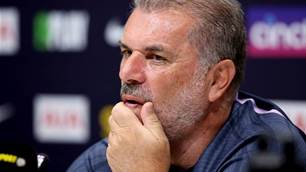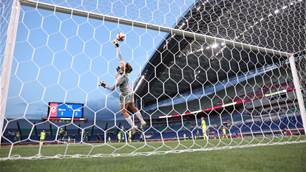WITH his double winners still scoring for fun, it's no wonder Carlo Ancelotti loves life in England. FourFourTwo pulls up a pew with the Chelsea boss to talk tactics, Capello and playing 'Playstation football'.
All of which puts Ancelotti in a good position to make sense of Fabio Capello's decision to change England's formation from a 4-2-3-1 to a seemingly outdatedand much more conservative 4-4-2 on the eve of the World Cup. "Tactics certainly counted
a lot, as the better organised teams were the ones who in the end went the furthest," Ancelotti insists. "The teams who focused more on individual talent went out early, like Brazil, Argentina and even England."
Capello was the second future England boss Ancelotti would work under, after Sven-Goran Eriksson, who was his manager at Roma from 1984-87. According to Ancelotti, the Swede ?had "great tactical knowledge and really understood the football of that time".
As a contemporary of Capello's, the Chelsea manager is naturally very respectful of everything his former Milan boss has achieved, praising his "great ability to prepare for matches properly, to read the opponents well, to find weaknesses in the opposition and to prepare his team in light of those weaknesses". But Capello was also the man who put an end to Ancelotti's playing career, and in his autobiography he describes the Three Lions manager as a grouch who didn't know how to talk to players. When asked if he could relate to the frustrations England's players felt in Rustenburg this summer, Ancelotti offers the type of answer that suggests working at Milan under Silvio Berlusconi has sharpened his mind for politics.
"My difficulty with Capello was born out of it being my final year as a player," he reveals. "Let's say that the philosophy of the club was that of giving more space to a young player in Demetrio Albertini. I was still a player at that time, so it was hard to understand the reasons behind that decision. Then after some time when I became a coach, these things made more sense, so my difficult relationship with Capello was only tied to this and nothing else. But it was a decision I found difficult to accept at the time."
Nevertheless, there is still a palpable rivalry between the two that bubbles underneath the surface. When Italy boss Arrigo Sacchi asked his former protege to be his assistant at the 1994 World Cup, Ancelotti accepted partly out of spite for Capello, admitting in his book that he muttered to himself: "Fine, you coach Milan, but I'll coach the national team." Capello's decision to refuse the Parma job in 1996 would also inadvertently give Ancelotti his first shot at the big time in charge of one of Italy's so-called 'Seven Sisters'.
Personality-wise, they really couldn't be any different. If Capello is perceived as being aloof and highbrow, spending his spare time investing in art or trekking around some ancient ruins, Ancelotti is by contrast warm-hearted, a real joker and has always cast himself as an ordinary guy, just as happy with a humble bowl of tortellini as a plate of haute cuisine. ?It's of little wonder that Paolo Maldini likened working with him to being in ?a "big family", something Ancelotti has tried to replicate at Chelsea.
"I always try and establish that kind of relationship, especially with the players, as a person, man to man, in the sense that I never consider myself above my players," Ancelotti says. "I try to be on their level. In that respect, communication is very important: talking to the players, listening to their problems, just trying to maintain a good relationship with them."
In that respect, Ancelotti has much in common with the great Nereo Rocco, one of Milan's most charismatic coaches, who won the European Cup twice in the 1960s. 'El Paron' famously used to sit on the bench wearing a suit, but also a pair of football boots. Later, after the game, he'd shower with the players, just to underline that they were all in it together.
That doesn't make Ancelotti old school. Tactically, his finger is - as you would expect ?- right on the pulse. "Football has certainly changed in terms of the speed of the game; ?the space in which you play has diminished. This is the big difference in the last 20 years," he says before swiftly alluding to the emergence of strikerless formations.
"The unpredictability of that style of play lies in the absence of a point of reference. ?The player of tomorrow will be ever more complete," he explains. "We're always looking for that kind of player. A striker who can play in every position, a central midfielder who has no problem playing on the left or on the right, or a defender who can play either as a full-back ?or a centre-back without any problem."
Chelsea's activity in the transfer market this summer is certainly indicative of that move towards universality. Take Ramires, for example. The £17m ($27m) signing from Benfica started out as a right-back at Cruzeiro before eventually moving into midfield so he can deputise for Paulo Ferreira or Branislav Ivanovic (who can also play left-back and centre-back respectively) if necessary. Yossi Benayoun, the Israeli link player, was brought in specifically for showing a greater tactical astuteness than Joe Cole - something both Ancelotti and Capello might actually be able to agree on.
Naturally, though, it's in the Champions League where Chelsea will come under most scrutiny. This is the competition that Ancelotti was appointed expressly to win, although ?doing so, he states, is an objective, not an obsession. "Right now I think it's difficult to ?say what's important because we are in all competitions and we want to be competitive until the end. Winning is a question of details," he claims. "Last year, we did very well in the Premier League, but we could have done better in the Champions League, and this is our objective. We want to continue doing well in the league and possibly improve on what we did last season in the Champions League."
Jose Mourinho unsurprisingly felt he had the last laugh on Ancelotti's first season when his Inter side knocked Chelsea out in the last 16 of the competition. At the time, it seemed ?like a step back: Chelsea had reached the semi-finals in five of the previous six years. But the notion of carpe diem is very much alive at the Bridge. If Chelsea were to win the Champions League up the road at Wembley next May, Ancelotti would not only lay the ghost of Mourinho definitively to rest and write a new groundbreaking chapter in the club's 105-year history. He would book his own place in posterity, becoming the only manager aside from the great Bob Paisley to win three European Cups. And that would raise eyebrows other than his own.
This article appeared in the December 2010 issue of FourFourTwo magazine. To buy back copies of this issue call 03-8317-8121 with a credit card to hand.
Related Articles

Postecoglou looking to A-League to 'develop young talent'
.jpeg&h=172&w=306&c=1&s=1)
Big change set to give Socceroos star new lease on life in the EPL













